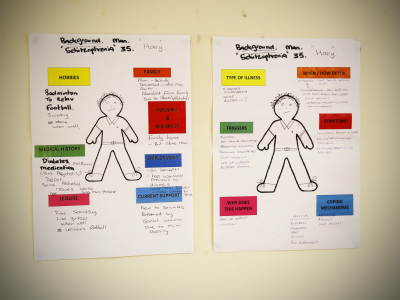
“What do we really mean by a person-centred approach? Saying the words and giving the theory is all very well, but it’s really hard to encapsulate what it feels like for the individual.”
Karen Robinson, quality officer at adult social care charity, Making Space, was looking for ways to give staff a new perspective on support planning. The charity wanted their support workers to understand what ‘personalisation’ really meant to individuals and they needed something that made it more real.
‘Moment of clarity’
“We needed to create something that would help support staff understand the difference it made when the service user was in control.”
A workshop was set up and service users from the charity’s involvement group were invited to attend. They were tasked with creating fictional characters with a range of different support needs, before writing what they thought would be a good care plan for that individual.
‘Major differences’
“Sometimes it’s about understanding that people need to take that extra step themselves and be enabled to do that, rather than the worker doing too much.”
A reduced emphasis on the support worker was one of the most significant differences in the care plans created by service users. One of the characters wanted to get back into employment and, rather than the support worker arranging an appointment at the job centre and searching online for opportunities, the service user took those steps.
‘Language and terminology is key’
“One of the difficulties historically is that often you may find people have similar information on their care plans, even when their needs are actually fairly different.”
The care plans created by service users were written in plain English, not in the terminology often used by professionals. For example: I need people to help me move, rather than ‘to transfer’; I need a shower every day, not ‘I need help meeting my personal hygiene needs’.
‘Specific, personalised goals’
“When you are so clear about the goals and objectives for an individual, it means you can evidence achievable outcomes being met.”
George, one of the fictional characters, wanted to feel more relaxed and have more time for his hobbies. George had lots of hobbies but the service user group said he actually had too many and that was part of his mental health condition. George’s goal was to concentrate on just three hobbies that he’s going to take up for the next six weeks.
‘Snowball effect’
“The posters of the characters have become integral to delivering our training”
Making Space’s new approach to care planning is now being rolled out across its services. Support workers are provided with a couple of lines from the fictional care plans, study the character posters and then continue the care plan in the same tone.
Crucially, the plans need to be written as ‘I want to do this and this is how I want you to support me’, rather than ‘you need this and this is what we, as support workers, will do to make it happen’. As Robinson says, “it’s such a subtle difference, but incredibly powerful when people get it.”
Photos: BellyFlop.TV







 A trauma-informed approach to social work: practice tips
A trauma-informed approach to social work: practice tips  Problem gambling: how to recognise the warning signs
Problem gambling: how to recognise the warning signs 




 Find out how to develop your emotional resilience with our free downloadable guide
Find out how to develop your emotional resilience with our free downloadable guide  Develop your social work career with Community Care’s Careers and Training Guide
Develop your social work career with Community Care’s Careers and Training Guide  ‘Dear Sajid Javid: please end the inappropriate detention of autistic people and those with learning disabilities’
‘Dear Sajid Javid: please end the inappropriate detention of autistic people and those with learning disabilities’ Ofsted calls for power to scrutinise children’s home groups
Ofsted calls for power to scrutinise children’s home groups Seven in eight commissioners paying below ‘minimum rate for home care’
Seven in eight commissioners paying below ‘minimum rate for home care’
 Facebook
Facebook X
X LinkedIn
LinkedIn Instagram
Instagram
Comments are closed.